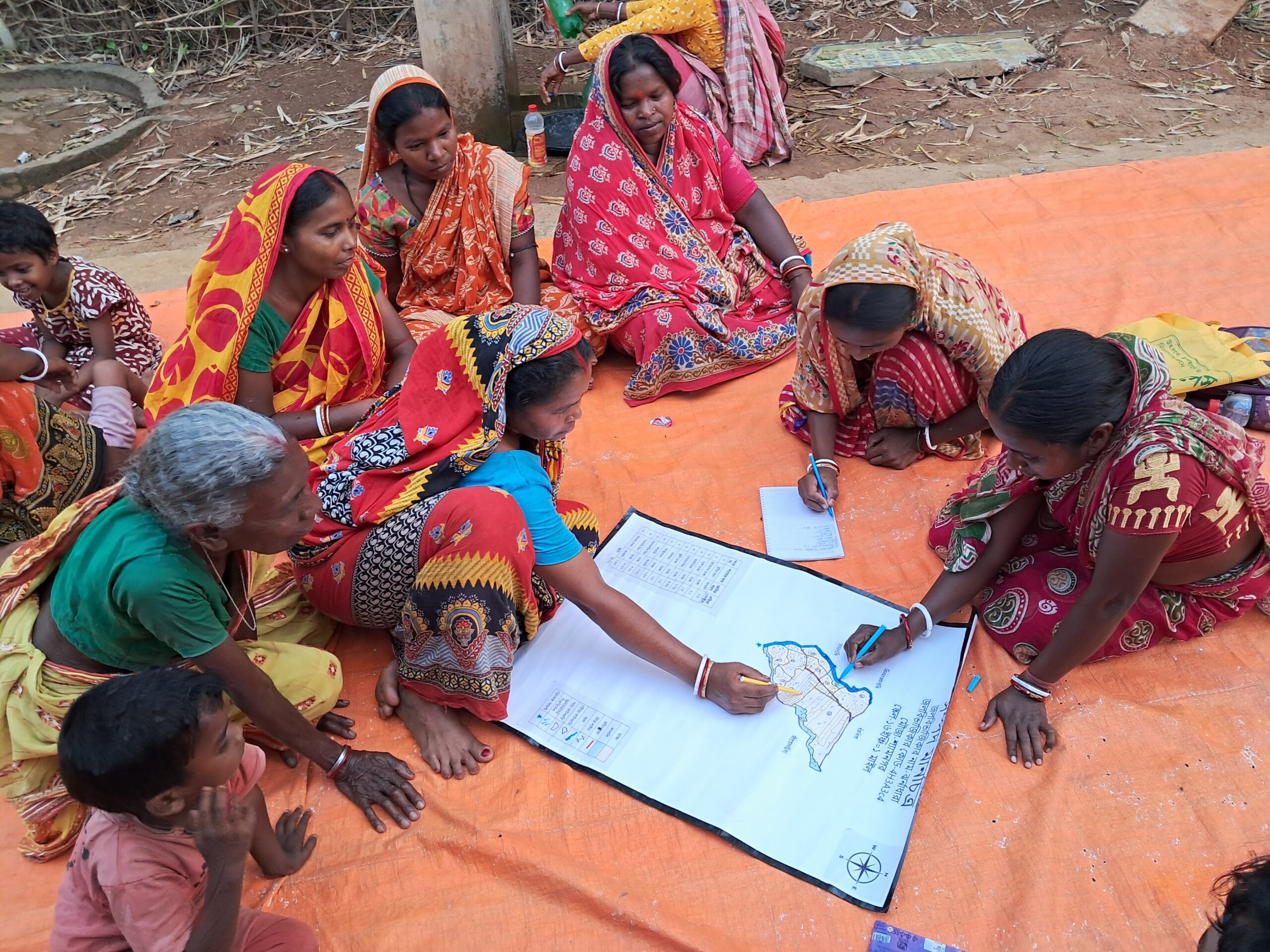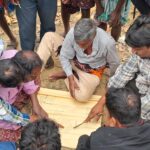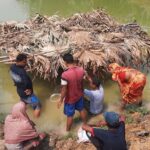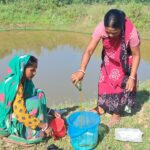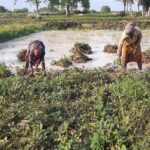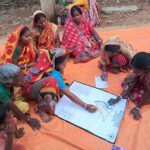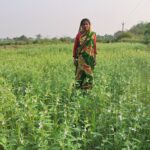USHARMUKTI towards Evergreen in West Bengal establishing ecosystem model for eastern India, supported by Indus Ind Bank Ltd.
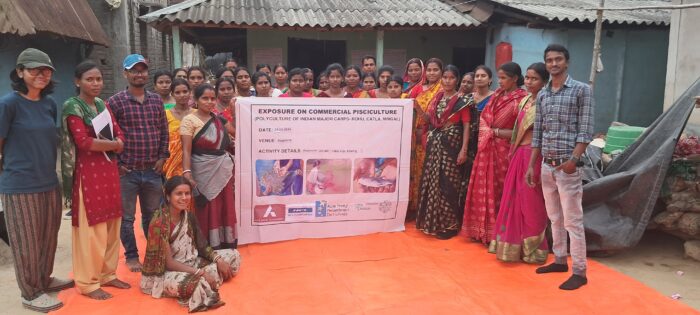 This is a partnership Project with 5 CSOs working in Eastern Region of WB, Rural Development Association is one of those. The geographical areas under this Project are 23 blocks of Bankura, Jhargram, Paschim Medinipur, Birbhum, Paschim Bardhamanand Murshidabad.
This is a partnership Project with 5 CSOs working in Eastern Region of WB, Rural Development Association is one of those. The geographical areas under this Project are 23 blocks of Bankura, Jhargram, Paschim Medinipur, Birbhum, Paschim Bardhamanand Murshidabad.
The objectives of the Project are to – Accelerate Natural Resource Management in Watershed mode to rejuvenate15000 hectares of degraded by leveraging Government programmes,
– Increase the area of about17,500 hectares under assured agriculture production
through adoptionof remunerative and regenerative practices,
– Trigger growth in the farm sector with sustainable annual household incomes
more than Rs. 1,00,000 for 70000 small and marginal farmers
– Enhance knowledge of about 2000 community leaders, PRO, Government and
CSO functionaries on climate resilientpracticesand their impacts onenvironment and people
Initially the project was sanctioned for 3 months, January – March 2024. Afterwards tit has been sanctioned for 3 Years April 2024 to March 2027.
Progress during this period is depicted below.
A Case Study:
Expectations of Transforming Single Crop into Year-Round
Cultivation through SLI
Shyamnagar
Lodhasuli GP
Jhargram Block
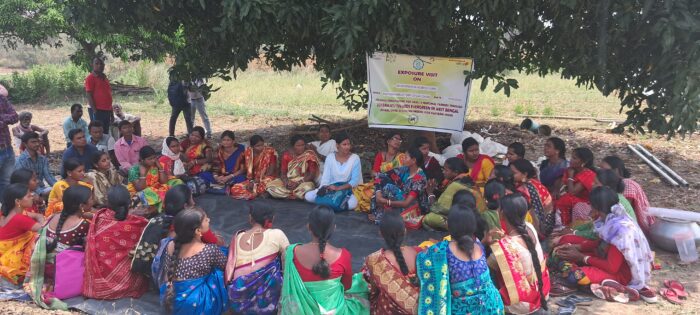 Understanding of problem:
Understanding of problem:
The shyamnagar mouza under Lodhasuli GP which is 27 kms away from Jhargram district HQ , 32 hectares of mid upland is totally dependent on rainfall for cultivation. Farmers cultivate only paddy in the rainy season but during the flowering time the flowers dry up due to shortage of rain. Quantity of production hampers due to that.
In winter few farmers cultivate mustard or paddy using Diesel pump set for irrigating the lands, which is quite costly. Baby Mahata expressed the iseries of the farmer families who cannot afford to use Diesel pump set for irrigating their land. For 6 times watering of 1 bigha of land total cost comes to Rs. 3600 to 4000 @ Rs. 600-650 for one time. This is not affordable for all.
Intervention for resolving:
Kuyari khal flows by the end of the Shyamnagar Mouza. RDA’s Team primarily worked on Soil and water conservation in Usharmukti but could not solve the problem.
Under Usharmukti Towards Evergreen Project supported by IBL solar pump has been installed under guidance of PRADAN. This would help to solve the water crisis for agriculture to a big extent and the farmers will be able to grow cereals(paddy),oil seeds (mustard, sesame, ground nut) and vegetables(bitter gourd, ridge gourd) collectively which would help enhancing the production and hence their income to a considerable
extent. Farmers with big, medium and small landholdings will be befitted in all the seasons.
Expected change in didis’ life:
Manimala di expressed her satisfaction and told that timely irrigation in three seasons would help increase the production of the crops.
Khalana di reiterated that her 1 bigha of land will become 3 bighas (by crop rotation) now. She expects her family’s income to enhance by Rs 70000 to 80000 in a year. They would renovate their mud hut to a pucca house.
Baby di wishes to send their children to a better school. Sumi di told that with the installation of the solar pump set vegetable cultivation of the families will increase and landless farmers will get jobs
Bulbuli di expected higher production of vegetables and the women would not have to head load the vegetables to the market. Vegetables of all the families will be truck loaded and sent to the market for selling. This will help to less their work load.
Expectations of Impact:
- 5 hectares of land will be cultivated thrice in a year.
- 35 families will work together
- Cost of irrigation will decrease: Irrigating land with diesel pump used to cost Rs. 108000 approx. Solar pump will reduce cost to Rs. 54000.
- Growing vegetable on 5 hac of land farmers will be able to earn Rs. 120000 approx. (240000*5 =120000)
Case story
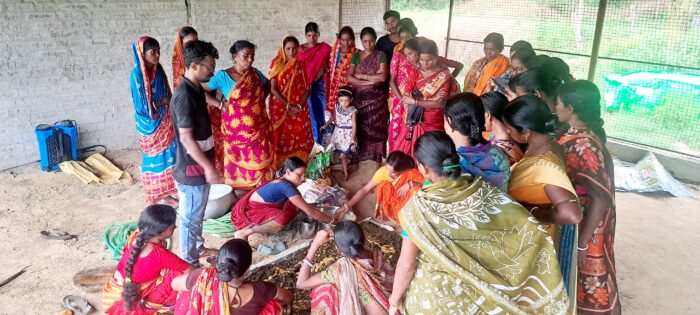 Sm. Sujata Mahata
Sm. Sujata Mahata
Vill.-Gira
Block-Jhargram
Dist.-Jhargram
Introduction:
I am Sujata Mahata, a resident of village Gira, falling under Jhargram Block of Jhargram District. My family is a small one with my husband and two children’s, one son and one daughter.
I came to this village after my marriage at a very young age. My husband had a piece of land of 6 bighas and my parents found him a suitable one.
Problem detection:
Initially we could run our family with the income from paddy cultivating in the land though earning was not very good. But after the children were born, we faced problems and realized that we have to try for better earning.We decided to grow oil seeds, vegetables after cereals but the income was not sufficient to run the family as we could not select the right time and were not aware of good practices because of it our interest in cultivation was gradually going down.
Intervention:
At this juncture we met RDA Dadas who organized a meeting with the female members and how to make them aware of growing vegetables, oil
seeds at the right time and following a good package of practice which would help them earn a higher income through Usharmukti Towards Evergreen
Project supported by IBL. We were inspired through the training and later formed a Producer Group (PG).
We planned to cultivate sesame in summer. Dadas of RDA guided us in adopting good POP and also helped us to receive 15 kgs of sesame seed from ADA office. We, the 15 members of the PG, purchased another 15 kgs of seed together for cultivation as cluster.
Changing in life & Expectations:
I cultivate sesame in 84 dec of land. From it expected income will be Rs. 20000.
Also, I procured 5 Kilos of fish fingerlings from Sumita di, one of the members of our PG who developed a nursery pond to grow fingerlings. I started fish rearing in my own pond. By the end of the year, I sold 80 kilos of fish and 20 kilos were consumed in my family. I earned Rs. 10400 form it. Therefore, my total income is increase into 30400. I expect if I cultivate cereals, oil seeds and vegetables in the land throughout the year along with fishery activity, the income will be more than Rs. 80000.
Also, I am hopeful that if we together cultivate following the guidance of RDA dadas, we the PG members would be able to earn good income each which would help to run our families well and we would be able to spend more on our children’s education.

